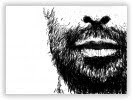| Jeff Tweedy |
Singer, songwriter, musician. Born on August 26, 1967, in Bellville, Illinois. First rising to prominence with the alternative country band Uncle Tupelo, Jeff Tweedy has established himself as an influential force in the music world. He started his first band in high school, a punk quartet called the Primitives with Jay Farrar, Wade Farrar, and Mike Heidorn. After Wade's departure, the remaining members formed Uncle Tupelo in 1987.
Uncle Tupelo emerged as one of the leading acts in the burgeoning alternative country—also called alt-country—music scene. The band members combined their love of punk and country music to create their own distinctive style. Tweedy worked with Jay Farrar on writing many of the group's songs and was viewed by some as the weaker, more pop-oriented member of this songwriting duo.
After playing numerous gigs in St. Louis and around the midwest, Uncle Tupelo landed a recording deal with the independent label Rockville. Their first album, 1990's No Depression, featured such songs as "Screen Door" and "Whiskey Bottle." The title track was a cover version of a song by A. P. Carter of the Carter Family. The album was warmly received by critics as was their next effort, 1991's Still Feel Gone.
For their third album, March 16-20, 1992, Uncle Tupelo worked with Peter Buck, the guitarist of R.E.M., who served as their producer. Switching to a major label, the group released their most critically heralded album Anodyne (1993). But this country-rock recording proved to be their last studio work together. Drummer Heidorn left the group in 1993, and Ken Coomer replaced him. The group also added John Stirratt on bass and Max Johnston on fiddle, banjo, and guitar. But Uncle Tupelo broke up in 1994 after Jay Farrar's departure. He left to start another group, called Son Volt.
Stepping out of Farrar's shadow, Tweedy soon formed Wilco with the remaining members of Uncle Tupelo. The band released its first album A.M. in 1995, which showed a further progression in Tweedy's musical style. While true to his Uncle Tupelo country roots, Tweedy incorporated more rock and pop elements into Wilco's sound. The band, which now included Jay Barrett, earned raves for its next effort, 1996's Being There, which drew from such musical references as the Rolling Stones and Phil Spector's wall-of-sound style of 1960s pop.
That same year, Tweedy collaborated with Dan Murphy of Soul Asylum, Gary Louris of the Jayhawks, and many others to create the side project, Golden Smog. The all-star alt-country lineup created their second album, Down By the Old Mainstream, in 1995. He continued to experiment musically when Wilco joined forces with British folk singer-songwriter Billy Bragg for 1998's Mermaid Avenue. With this joint venture, Tweedy helped create music to accompany lyrics written by famed folk singer Woody Guthrie. Two years later, Wilco and Bragg reunited for Mermaid Avenue Vol. II.
Wilco's next album, 1999's Summerteeth, featured an unusual juxtaposition between somber, disturbing lyrics and bright-sounding pop music. While some critics did not know quite what to make of this album, Tweedy faced an even greater battle with Wilco's next recording. He continued to experiment musicially, and the album Yankee Hotel Foxtrot led to a clash between the band and their record label. Reprise refused to release the album, claiming it was not commercially viable. Wilco eventually sold the recording to Nonesuch Records, and it received stellar reviews after its 2002 release. The making of Yankee Hotel Foxtrot became the subject of the documentary I Am Trying to Break Your Heart. The film also captured the growing tension between the rest of the group and Barrett, who left Wilco in 2002.
Despite his critical and commercial success, Tweedy struggled in his personal life. He battled with depression and anxiety, and suffered from chronic migraines. As a result, he went into a rehabilitation facility in 2004 to deal with his chemical dependency and mental health issues. Returning to work, Tweedy continued to create interesting experimental rock on Wilco's next release, 2004's A Ghost Is Born. He told Rolling Stone magazine that much of the album's songs dealt with "searching for identity."
In addition to his work with Wilco, Tweedy joined forces with producer Jim O'Rourke and drummer Glenn. They called themselves Loose Fur, and put out two records on the Drag City label—a self-titled album in 2003 and Born Again in the USA in 2006.
The following year, Wilco released Sky Blue Sky, which pulled from a number of inspirational sources, including folk, soul, and gospel music. "There's probably not any kind of music that means more to me than gospel and soul. If I could be any type of singer in the world, it would be like an Otis Redding. I heard somebody say that soul music is being proud of where you're from and what you've accomplished, and letting that show," Tweedy told Mother Jones magazine.
Tweedy's latest album with Wilco came out in 2009. Working toward simplicity and musical clarity, Wilco (The Album) featured such songs as the ballad "You and I" on which Tweedy sings a duet with musician Feist. Another important song on the album, at least to Tweedy, was "Bull Black Nova." The song "feels like it might be a centerpiece. There's a certain urgency and anxiety to it. It kind of sounds like there's a phone off the hook somewhere. There's a precise wildness to it," Tweedy explained to GQ magazine.
Tweedy lives in Chicago with his wife and two children.


No comments:
Post a Comment